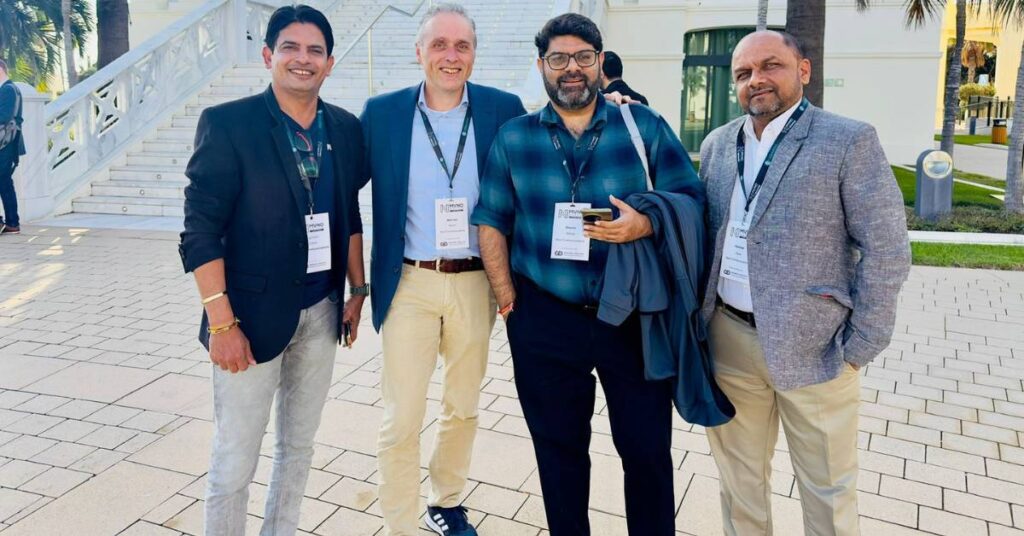When Jignesh Dave decided to launch his fourth startup, he could have chosen any number of global tech hubs. Silicon Valley beckoned with its venture capital magnetism. London offered financial services expertise. Singapore promised Asian market access. Instead, this seasoned entrepreneur with 25 years of experience in operational, market, and financial risk mitigation set his sights on an unexpected destination: the Netherlands.
Today, that decision looks prescient. Next Communications, Dave’s telecom innovation company, has transformed from a startup idea into a global disruptor offering Airtime as a Service (AaaS) across three continents. The journey from concept to international success story highlights both the promise and pitfalls of the Dutch Startup Visa program, revealing why the Netherlands has become an unlikely yet powerful launching pad for global entrepreneurs.
The Strategic Gamble

Dave’s choice of the Netherlands wasn’t driven by personal connections or chance encounters. It was a calculated strategic decision based on infrastructure, opportunity, and vision.
“The Netherlands, with its strong infrastructure and global connectivity, was chosen as the launchpad for Next Communications,” Dave explains.
The country’s geographical positioning as a gateway to European markets, combined with its progressive business environment and access to international markets, aligned perfectly with his mission to innovate in the telecom sector.
At Next Communications, Dave’s focus centres on bridging the gap between established telecom providers and market disruptors. His Airtime as a Service solution enables businesses to offer branded mobile connectivity through a streamlined three-step process, eliminating the traditional complexity that has long plagued the telecom industry.
It’s an approach that emphasises simplicity and efficiency, qualities that would prove essential during his startup journey in the Netherlands.
A Streamlined Path to Success
The Dutch Startup Visa process turned out to be remarkably accessible for Dave, reflecting the program’s design to attract international entrepreneurs. He says the application process was relatively smooth, and “the support system provided by RVO (Netherlands Enterprise Agency) demonstrated the country’s commitment to fostering international innovation.”
He further adds that working with experienced facilitators makes the process well-structured and offers a supportive framework that goes beyond mere visa approval.
While his vision was clear, the path to implementation proved more complex than anticipated. The initial visa application process went relatively smoothly, but significant challenges emerged once the business registration was completed.
“As a foreign director and ultimate beneficial owner, I encountered what many international entrepreneurs face in the Netherlands: the banking barrier,” he tells me. “Opening a bank account turned out to be nearly impossible, resulting in a six-month delay in business operations,” Dave recalls, before adding that RVO and his facilitator helped him with the right solution.
This partnership approach – combining institutional support with practical execution – proved crucial in enabling Next Communications to proceed with its mission.
The Dutch Advantage
Once operational, Dave discovered that his strategic bet on the Netherlands was paying dividends across multiple dimensions. The country’s geographical placement provided seamless access to European markets, while its business-friendly regulatory environment facilitated smooth operations.
But perhaps most importantly, the Netherlands offered something increasingly rare in the global talent market: a highly skilled, English-speaking workforce.
“The Netherlands, boasting one of Europe’s highest rates of English-speaking professionals, has been a game-changer in streamlining operations and fostering international partnerships,” Dave notes.
This linguistic advantage, combined with the country’s progressive startup environment, created ideal conditions for scaling an international business.
The RVO’s startup ecosystem, particularly its integration of facilitators, provides comprehensive support across strategy, execution, and funding readiness. This wasn’t just bureaucratic assistance; it was a strategic mentorship that helped navigate challenges, secure funding, and drive innovation.
International Traction

The Netherlands-based launch strategy has yielded impressive international results. Next Communications has successfully onboarded a reputable French and Dutch airline as customers, along with a major US-based financial services enabler. This initial traction has opened doors to offer Airtime as a Service to 75 banks and non-banking financial corporations in India, demonstrating the global scalability that the Netherlands provides.
The credibility gained from operating in the Netherlands has also attracted strategic investors.
“The confidence shown by mentors investing their own funds has strengthened our credibility, attracting strategic investors eager to come onboard,” Dave explains.
This virtuous cycle – where initial success attracts investment, which enables further growth – illustrates why location is significant for startups seeking global reach.
Lessons for Future Founders
Dave’s experience offers valuable insights for other entrepreneurs considering the Dutch Startup Visa, which has evolved significantly in its ten years of existence. His primary advice centres on preparation and strategic foresight.
“While registering a B.V. is straightforward, opening a bank account as a foreign director can be challenging,” he warns, adding, “Early financial setup, legal guidance, and working with trusted facilitators can help mitigate delays and secure the right business structure.”
Beyond logistics, Dave emphasises the importance of ecosystem engagement. The Dutch startup scene offers experienced mentors, accelerators, and funding networks that provide strategic guidance beyond visa approval. Founders should actively leverage RVO’s support framework and establish strong local connections to ease operational setup and funding readiness.
Most importantly, he stresses resilience and adaptability.
“The process may come with unexpected obstacles, but with the right support system and a proactive approach, the Netherlands can be a powerful launchpad for global growth.”
The Road Ahead
With a solid foundation established in the Dutch market, Next Communications is positioning itself for global expansion. The company plans to leverage the Netherlands’ geographical advantages, business-friendly environment, and talent pool to expand across Europe, Asia, and Africa.
The next phase involves deepening partnerships with major brands, refining the AaaS offering, and enhancing delivery of seamless, brand-led mobile connectivity to businesses worldwide.
Innovation remains at the core of the vision, with plans to integrate advanced technologies like Generative AI for subscriber lifecycle management while continuing to simplify telecom complexities for clients. Next Communications positions itself as a “layer 2 disruptor” bridging established providers with emerging market entrants, ensuring businesses can scale communication solutions without navigating intricate telecom ecosystems.
Dave’s journey from telecom veteran to Dutch startup success illustrates both the potential and pragmatic realities of international entrepreneurship. His experience suggests that while the Netherlands may not have Silicon Valley’s name recognition, it offers something equally valuable: a strategic platform for global growth, supported by thoughtful policies and practical execution. For entrepreneurs willing to navigate its complexities, the Netherlands provides not just a visa but a pathway to international success.









